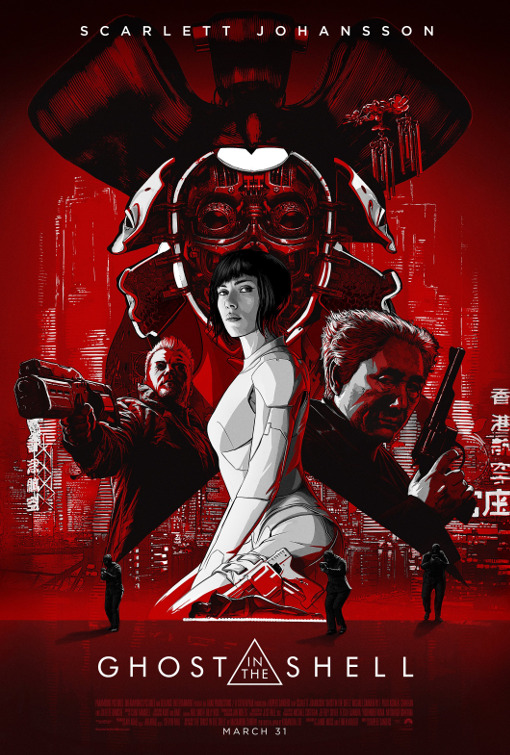They Built Her But They Cannot Control Her
Director
Rupert Sanders
Starring
Scarlett Johnasson
Michael Pitt
Pilou Asbæk
In the future, the line between man and machine is blurred. Most of humanity has embraced electronic upgrades and become varying levels of cyborgs, from simple enhancements to full limb and organ replacement. With so much sensitive information and personal identity exposed to a new wave of crime, the government set up Section 9 to police cyber-attacks. One of their latest recruits is Major Mira Cullen [Johansson], a refuge whose boat was attacked by terrorists and the government save her life by transplanting her brain into a fully mechanical body. Along with her partner Batou [Asbæk], the Major uncovers a hacker going by the alias Kuze [Pitt] who is hellbent on taking down Hanka Robotics, the firm that built the Major’s body and in the process uncovers certain truths about her own past.
As much as I hate how the following will sound, this release is the very definition of all shell and no ghost. This is a movie created to replicate the substance of the original without understanding the nature of its soul. Like so many enduring films, we initially lust after the visuals but form a longer-lasting love for the concept at its core, which plays with our mind long after viewing. That’s not to say there is none of that present in this live-action adaptation but only trace amounts that won’t have the same impact. Visually spectacular but narratively vapid. Just to prepare you, a lot of this lengthy review will be specific variations on that one sentence.
For those who have no prior knowledge of the Ghost In The Shell franchise, this series was a manga/comic first which was then adapted into an animated film which was wonderful and ground-breaking but a little convoluted. The true gold standard however, animated series, Ghost In The Shell: Stand Alone Complex. As with many adaptations, there’s often too much source material to know where to start. The difference here is that the film that most people are familiar with is only 82 minutes long and manages to establish so much in terms of characters and universe building than this film could with 82 hours. So, astonishingly, despite a longer runtime, we end up with less substantial content. Admittedly, one could say that without prior knowledge of what came before it functions acceptably and many cinemagoers will enjoy the spectacle and approachable simplicity of the story but in truth this is such a wasted opportunity. Throughout the film, fans are placated, given enough familiarity with names and scenes but these lose all meaning and impact as they are hollowed out and presented differently without justifiable reason. One could argue runtime is a factor but, again, the original did it in 82 minutes. Let’s take a specific example: one of the most iconic scenes in the 1995 release is that a bin-man has been hacked and given false memories, meaning he is travelling along his route, hacking on behalf of the elusive individual Section 9 are tracking. As soon as he realises the cops have figured out the points appear along a garbage collection route, he hurries to the hired hacker/assassin who put him up to the job. In doing so, the bin-man leads the Major to a potential lead and he is chase through the city using camouflage, taking out bystanders before a climactic showdown in shallow water. In this version, the hacker with the camo gear and the bin-man have been amalgamated and the only reason they are chosen is because they happen to be operating their truck near Kuze’s target. But then the scene progresses with gun fire and the camo suit. So, are all garbage truck men heavily armed? Or just these two? It also cheapens the actual police work done by Section 9 and makes them pretty useless. It may seem trivial but it highlights the bad decision making that creates something that doesn’t make sense for new audiences and infuriates fans that are supposed to be enthralled.
**Spoilers at the end of the paragraph**
With the fact that practically everyone is constantly connected to high-tech computing devices at all times, the next logical step is to have an iPhone implant. As such, what seemed like radical science fiction future in the mid 90’s is really a couple of progressive leaps away from reality. As such, this is potentially the perfect time to release a film about a unit with cybernetic upgrades and enhancements that polices hackers and cyber-crime. But again, there is that core issue of a displeasing script; not exactly stupid but full of stupidity. Too much convenience pushes the story forward: at one point Section 9 raid a Yakuza controlled bar and come across a network of human slaves being used to hide Kuze’s signal, meaning he is almost impossible to track. Except… he’s in the very same building so one can only question what was the point of that human network then? Then you have Mira’s realisation that she needs to return to Hanka after swimming in the bay. The whole thing feels like an excuse to include another visual tickbox from the original rather than discussing any of the important subject matter covered in said scene. Anyway, she goes back to Hanka and realises that they are trying to deactivate her and Mira’s survival relies entirely on Dr Ouélet [Juliette Binoche] not killing her. There is no excuse for this level of lazy writing, especially not when you have a decent blueprint already laid out for you!
I will openly concede that the film is a technical wonder. The visuals are extraordinarily pleasing; from the production design to the VFX, everything feels like an alternative-universe Asian city existing simultaneously in the past, present and future. With its angular 80’s designs, Blade Runner level of contrasting neon and grime, and abundant future technology it’s an absolute feast. Equally, the sound design is pretty decent but the music is such a stumbling block. The original score is beyond iconic, both in the movie and the series. The pairing of ancient instruments, choral techniques and electronic music is enchanting and frankly haunting; once again, building on the themes at the heart of the film about pairing the old and the new. For this release we have Lorne Balfe and Clint Mansell, two composers from whom I have immense respect who have produced truly interesting and captivating works in their own right, even without the visuals. So imagine my utter disappointment when I discovered the only present is a serviceable but ultimately background cycling of digital music. Perfectly acceptable but hardly stirring.
The acting is much harder to quantify. On the one hand, there are some decent performances and solid casting choices, on the other we need to address the overall white washing. As stated, this franchise is Japanese but there is a big debate regarding the ethnicity of the cast. There are those that believe this should be an entirely Japanese or Asian cast, to honour the source material and those who believe it doesn’t matter. To play devil’s advocate for a second, this is one of those rare properties that I actually understand both sides of the argument. First of all, Motoko Kusanagi (the Major in the anime) is a robot so there’s absolutely no reason she should be Asian (the film actually addresses this reasonably well). Secondly, the original Ghost In The Shell stated that in the future ethnicity isn’t as big of an issue because the nature of cyber enhancements means that you can be anything you want and one of the main themes running throughout is that self-identity does not mean defining yourself by the construct you inhabit; a fact that is brought up frequently by the fact that Togusa (played by Chin Han here) has little to no implants and uses an outdated weapon because he doesn’t exactly trust technological advances feeling that his humanity would be compromised (the film addresses this rather poorly). And finally, the city is a multicultural hub, so of course there will be a range of faces and races in this metropolis. That being said, there weren’t nearly enough Asian actors in prominent roles. The argument presented by the filmmakers was that a) she’s a robot and b) you cast someone like Scarlett Johansson to get the studio to give you more money and to get other, lesser known, actors. While the first part of the argument holds up, the latter does not as the film is so heavily western with throw away roles given to actors like Takeshi Kitano and Kaori Momoi; although they both do a great job with what they’re given. Setting that to one side for a second, Johansson builds on her otherworldly vacant stares from Under The Skin and Michael Pitt performs admirably with a weak script but everyone else is surprisingly flat. While Pitt’s role is more misunderstood victim than true adversary, the key villain, Cutter [Peter Ferdinando], feels like a lazy scrape from Robocop and I would be arguably fine with that if he wasn’t such a bland and obvious suit from the very beginning.
For anyone who has a history with Ghost In The Shell, this is an admittedly pretty flaming mess. Sure, the flames give an enticing glow but everything is still fucking burning. To those who are just going in for a contemporary action film, this has enough of a brain to dazzle and entice. Boiled down, stripped of its meaning and repurposed as a completely different entity – but were we really expecting anything else?
Release Date:
31st March 2017
The Scene To Look Out For:
**Spoilers within**
Once Hanka finally turns on Section 9 outright, with no obvious covering plan of deniability (again, scripted stupidity), operatives are sent to execute the Section 9 agents. Admittedly, we only see a handful of attempts but watching the section leader, Daisuke Aramaki played by “Beat” Takeshi, foil an assassination attempt with a revolver and a metal briefcase was pretty impressive. Subtle acting, great direction and a frustrating look at everything this film could have been. Although, I will admit, most of the helicopter fly-overs and pans over the city are pretty stunning.
Notable Characters:
Judging these people without taking into account previous, superior, animated versions is tricky but in truth, Michael Pitt’s performance is decent. He doesn’t have a great deal to do but what he produces with it is subtle, nuanced and compelling.
Highlighted Quote:
“When we see our uniqueness as a virtue, we finally know peace”
In A Few Words:
“In every single regard, this adaptation is an utter waste of potential”
Total Score: 2/5

![The Red Right Hand Movie Reviews [Matthew Stogdon]](https://reviews.theredrighthand.co.uk/wp-content/uploads/2021/12/cropped-header1.png)



